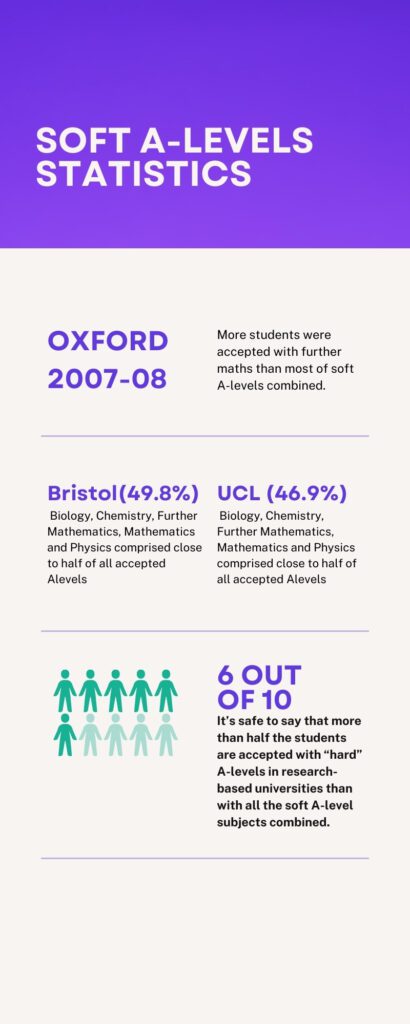When planning your academic journey, the question of which A-level subjects to choose looms large. Amongst all available options, “soft A-levels” often become a focal point of discussion for students aiming to maximise their university admission prospects. This blog aims to inform you about soft A-levels, providing a clear understanding, a list of these subjects, guidance on whether you should choose them, and a concluding overview to help you make informed decisions to maximise you exam success.
What Are Soft A-Levels?
Soft A-levels refer to subjects that are perceived as less rigorous or academically demanding compared to their “hard” counterparts, such as Maths, Sciences, and Humanities.
This distinction often stems from the subjective viewpoint of universities and employers who may regard these subjects as providing a less solid foundation for advanced study or professional development. However, it’s crucial to approach this classification with nuance, recognising that every subject offers unique skills and learning opportunities.
List of Soft A-Levels
The soft A levels list includes subjects that span a wide range of disciplines, reflecting diverse interests and talents. Notable subjects considered to be in this category are:
- Media Studies
- Business Studies
- Accounting
- Health and Social Care
- Information and Communication Technology
- Art and Design
- Leisure Studies
- Communication Studies
- Music Technology
- Theatre Arts, Dance, and Performance Studies
- Visual Arts and Photography
- Film Studies
- Physical Education and Sports Studies
- Home Economics
Additionally, subjects like Sociology and Psychology, while academically rigorous, are sometimes perceived as softer due to the competitive nature of certain university courses.
Choosing Soft A-Levels
The choice to pursue soft A-levels should be informed by personal interests, career aspirations, and the strategic consideration of university requirements. While these subjects can offer valuable skills and align with certain career paths, students aiming for competitive programmes at research-intensive universities should heed the admissions trends. Combining soft A-levels with traditional, facilitating subjects can provide a balanced profile, appealing to a wider range of universities.
Understanding Hard A-Levels
In contrast to soft A-levels, hard A-levels are subjects typically viewed as more academically challenging and rigorous. These include:
- Mathematics and Further Mathematics
- Sciences (Physics, Chemistry, Biology)
- Humanities (History, Geography)
- Languages (Modern and Classical)
- English Literature
These subjects are often preferred by universities for their rigorous analytical and critical thinking skills development. They are considered “facilitating subjects” because they keep a wide range of university courses and career options open.
Is Choosing Hard A-Levels Preferred?
The hard truth is that A-levels like Mathematics, Sciences, and traditional Humanities, are often lauded for their rigour and are preferred by research-intensive universities. The stark contrasts in acceptance rates between soft and hard A-levels underscore the importance of strategic subject selection. For example, universities like Oxford and UCL have a significantly higher uptake of traditional science and mathematics subjects compared to soft ones, reflecting their preference for a solid academic foundation.

Making Informed Decisions
The decision between soft and hard A-levels should not be taken lightly. Transparency from universities regarding preferred subjects is paramount to help students make informed choices.
For students, the key is to navigate with a clear understanding of how subject choices can impact university admissions. Understanding A Level grade boundaries is also essential, as different subjects may have varying marking criteria that affect final results. Balancing personal interests with strategic selections can open doors to both fulfilling studies and future career paths. It’s not just about choosing the “easiest A Levels” but selecting the best A-level combinations that align with your aspirations and the realities of higher education admissions.
When to Seek Help
If at any point you feel like you’re struggling to choose subjects, to study, or just feel discouraged, reach out to Edumentors’ A-level tutors and get guaranteed help from top student-tutors in the UK, who can relate to you experiences and share invaluable insights.

Aran A.
Maths | English Tutor
Student at UNIVERSITY OF CAMBRIDGE
£20 Per session
Book Free TrialFinal Thoughts
In essence, while soft A-levels offer valuable pathways for many students, a strategic approach, combining passion with pragmatism, is essential for those aiming for top universities. Awareness and understanding of the nuances of subject selection will empower students to craft an academic journey that is both rewarding and aligned with their long-term goals.








